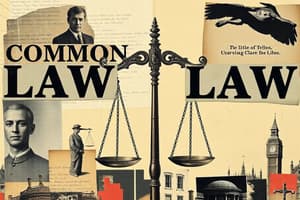Podcast
Questions and Answers
What principle ensures that in criminal cases, the accused is viewed as innocent until proven guilty?
What principle ensures that in criminal cases, the accused is viewed as innocent until proven guilty?
- Access to Justice
- Freedom from Self-Incrimination
- Burden of Proof
- Presumption of Innocence (correct)
Which branch of law primarily seeks to provide monetary compensation rather than punishment?
Which branch of law primarily seeks to provide monetary compensation rather than punishment?
- Civil Law (correct)
- Criminal Law
- Administrative Law
- Constitutional Law
What is the main purpose of separating powers among different branches of government?
What is the main purpose of separating powers among different branches of government?
- To provide checks and balances (correct)
- To simplify the legislative process
- To enhance government efficiency
- To increase governmental authority
What factor often plays a significant role in shaping the nature of a legal system within a country?
What factor often plays a significant role in shaping the nature of a legal system within a country?
What does the high burden of proof in criminal law require from the prosecution?
What does the high burden of proof in criminal law require from the prosecution?
What primarily distinguishes common law from civil law systems?
What primarily distinguishes common law from civil law systems?
Which of the following is NOT a core function of a legal system?
Which of the following is NOT a core function of a legal system?
Which component of a legal system is considered the highest form of law?
Which component of a legal system is considered the highest form of law?
In a common law system, how do judges primarily establish legal principles?
In a common law system, how do judges primarily establish legal principles?
What principle ensures that individuals are treated fairly during legal proceedings?
What principle ensures that individuals are treated fairly during legal proceedings?
Which of the following best describes the role of administrative agencies in a legal system?
Which of the following best describes the role of administrative agencies in a legal system?
What element serves as a source of law primarily in common law systems?
What element serves as a source of law primarily in common law systems?
Which statement accurately reflects the application of the 'Rule of Law' in a fair legal system?
Which statement accurately reflects the application of the 'Rule of Law' in a fair legal system?
Flashcards
Legal System
Legal System
A collection of laws, rules, and regulations that govern a society.
Common Law
Common Law
A legal system where judges use past decisions to make new rulings.
Civil Law
Civil Law
A legal system based on written laws created by legislatures.
Constitution
Constitution
Signup and view all the flashcards
Statutes
Statutes
Signup and view all the flashcards
Regulations
Regulations
Signup and view all the flashcards
Case Law/Precedents
Case Law/Precedents
Signup and view all the flashcards
Rule of Law
Rule of Law
Signup and view all the flashcards
Presumption of Innocence
Presumption of Innocence
Signup and view all the flashcards
Separation of Powers
Separation of Powers
Signup and view all the flashcards
Access to Justice
Access to Justice
Signup and view all the flashcards
Criminal Law
Criminal Law
Signup and view all the flashcards
Study Notes
General Concepts
- A legal system is a collection of laws, rules, and regulations that govern a society. It provides a framework for resolving disputes, maintaining order, and enforcing societal norms.
- Legal systems vary significantly across countries and cultures, reflecting diverse historical, social, and political contexts.
- Core functions of a legal system include dispute resolution, social control, and promoting justice.
Types of Legal Systems
- Common Law: This system is based on precedents established by judges' decisions in previous cases. Judges interpret laws and create legal principles through this process of case law. Found primarily in countries with a British colonial past, including the United States and England.
- Civil Law: This system is based on codified laws written by legislative bodies. Judges apply these codified statutes to specific cases, with less emphasis on prior judicial precedent. Characterized by comprehensive written codes and more codified laws, commonly found in continental Europe or parts of Latin America.
Key Components of a Legal System
- Constitutions: Fundamental laws that establish the structure and powers of a government, and define the rights and freedoms of citizens. These are typically the highest form of law, often requiring very specific processes for amendment.
- Statutes: Laws enacted by legislative bodies, which typically address specific areas of law. They are a primary source of law in most legal systems.
- Regulations: Rules and guidelines made by administrative agencies, interpreting or supplementing statutes. They are often necessary to provide the specifics to laws.
- Case Law/Precedent: Decisions made by judges in court cases. These decisions set precedents that are binding or persuasive on subsequent cases. This plays a pivotal role in common law systems.
- Legal Procedures: Formal processes and rules for bringing and resolving legal conflicts (e.g., pleading, discovery, trial). These procedures create predictability and fairness in legal proceedings.
Key Principles of a Fair Legal System
- Rule of Law: Everyone is subject to and accountable under the law, regardless of their position or power. Implies transparency and consistency in the application of laws.
- Due Process: Fair treatment of individuals in legal proceedings, ensuring they are given adequate opportunities to present their case and defend themselves. This includes rights for access to legal counsel, and freedom from self-incrimination.
- Presumption of Innocence: In criminal cases, the defendant is considered innocent until proven guilty. The burden of proof rests on the prosecution to demonstrate guilt "beyond a reasonable doubt".
- Separation of Powers: Dividing governmental powers among different branches (legislative, executive, and judicial) to prevent any one branch from becoming too powerful. This is meant to check and balance governmental power.
- Access to Justice: Ensuring all members of society have an equal opportunity to pursue legal remedies for both themselves and the general society.
Types of Law
- Criminal Law: Deals with offenses against the state or society. Typically involves punishment (fines, imprisonment, or both) for violators. The burden of proof is high. Primarily focused on protecting the overall public order.
- Civil Law: Deals with disputes between private citizens or organizations. These disputes usually result in monetary compensation and not prison time. Aims to compensate the wronged party rather than punish a perpetrator.
- Constitutional Law: Deals with the interpretation and application of the constitution. Focuses on fundamental rights and powers of government. Very important for defining the relationship between the citizen and the state.
Influence of Legal Systems
- Culture and history often shape the nature of a legal system. Different countries, or even different parts of a country may feature differing legal principles and traditions.
- Legal systems evolve over time with changing social and political circumstances. New laws are introduced or existing ones adjusted based on social contexts.
- Globalization and international treaties influence legal systems and create international standards for managing the diverse legal issues.
Studying That Suits You
Use AI to generate personalized quizzes and flashcards to suit your learning preferences.



